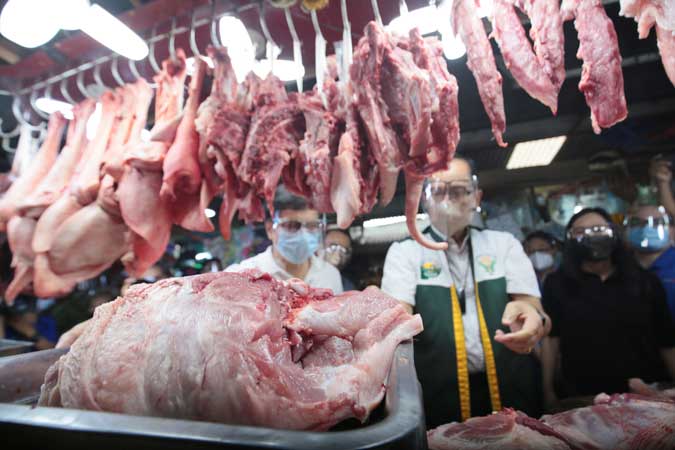Legislators declare intent to oppose higher pork import quota

LEGISLATORS are gearing up for a fight after the government announced plans to expand the allowable quota of pork imports, saying that allowing more pork into the country at lower tariff rates will cost the government billions of pesos in revenue.
The opposition was coalescing following a proposal to drastically increase the minimum access volume (MAV), the quota within which imports are charged low tariffs.
Senator Franklin M. Drilon said in a radio interview Wednesday that based on data presented at a hearing of the Senate Committee of the Whole on April 12, pork imports in the last 10 years averaged 125,000 metric tons (MT), a level of imports sufficient to keep pork prices in a range of P180 to P200 per kilogram.
“This is why we cannot see the reason why pork tariffs should be lowered and the MAV allocation of pork imports to be increased. The government can potentially lose P11 billion… (from) lower tariffs,” Mr. Drilon said.
As a result, Mr. Drilon said a proposed joint resolution will be filed, supported by Senators Cynthia A. Villar and Francis N. Pangilinan, to revoke Executive Order (EO) No. 128, which lowered the tariff rate on pork imports.
He added that if Congress fails to act on President Rodrigo R. Duterte’s recommendation to increase the pork import MAV quota within 15 days, it will be deemed approved under Republic Act No. 8178 or the Agricultural Tariffication Act.
“We cannot act on the recommendation since it was given to us during the Senate’s last session day on March 26. It is impossible. But this shows that the power to determine the number of pork imports is with Congress,” Mr. Drilon said.
“The remedy we see is to create a joint resolution to reset the MAV allocation to its previous volume, or approve an allocation under the 125,000 MT average import level for the last 10 years,” he added.
Mr. Duterte has recommended that Congress increase the MAV allocation by 350,000 MT, adding to the current quota of 54,210 MT, in order to address the supply deficit projected by the Department of Agriculture of 400,000 MT.
On April 7, Mr. Duterte issued EO 128 which lowered the tariff on pork imports within the MAV quota to 5% in the first three months, increasing to 10% in the following nine months.
The EO also reduced the tariff on out-of-quota pork imports to 15% in the first three months, rising to 20% in the succeeding nine months.
Previously, pork imports within the MAV quota paid 30%, while out-of-quota imports were charged 40%.
Meanwhile, the MAV scheme applies to farm commodities that can be imported with lower tariffs in order to facilitate trade, and is part of the commitment of the Philippines to the World Trade Organization.
Agriculture Secretary William D. Dar has also a suggested retail price (SRP) for imported pork products, with imported pork shoulder (kasim) at P270 per kilogram, and imported pork belly (liempo) at P350 per kilogram.
Mr. Dar said no new SRP will be issued for domestic pork products.
The new SRPs for imported pork replaced EO 124, which lapsed on April 8. It had capped the price of kasim at P270 per kilogram, liempo at P300 per kilogram, and whole chicken at P160 per kilogram.
Pork supply is tight because of the impact of African Swine Fever on domestic growers, leading to rising prices and threatening another inflation crisis.
Marikina City Rep. Stella Luz A. Quimbo said in a statement Wednesday that the reduction of pork import tariffs is premature because importers can price their products without concern for competition, reducing the possibility that lower tariffs will help bring down retail prices.
Ms. Quimbo added: “If the government is allowed to import pork at the new reduced tariffs and sell directly to consumers, then importers will face competition. This is one way to ensure that reduced tariffs will translate to lower prices in the markets.”
“Otherwise, importers can simply purchase low and continue to sell high in the market, especially if they engage in anti-competitive practices such as price fixing,” she added.
Seventeen House legislators filed a joint resolution Wednesday seeking the termination or withdrawal of EO 128, and the rejection of the planned increase in the pork MAV.
Signatories to the proposed joint resolution were Rep. Carlos Isagani T. Zarate; Rep. Jose Christopher Y. Belmonte; Rep. Argel Joseph T. Cabatbat; Rep. Eufemia C. Cullamat; Rep. Sarah Jane L. Elago; Rep. Jonathan Keith T. Flores; Rep. Janette L. Garin; Rep. Edcel C. Lagman; and Rep. Noel L. Villanueva; Rep. Geraldine B. Roman; Rep. Rico B. Geron; Rep. Ferdinand R. Gaite; Rep. Edgar R. Erice; Rep. Lorenz R. Defensor; Rep. France L. Castro; Rep. Arlene D. Brosas; and Rep. Rose Marie J. Arenas.
“EO 128 would (cause) irreparable damage to the pork industry and to the agricultural sector as a whole,” according to the resolution.
“The further decline of the pork industry will also affect many allied industries, including poultry, corn farmers and coconut farmers, and other such industries using or dependent on pork products will likely impact on the country’s agricultural development,” it added. — Revin Mikhael D. Ochave



